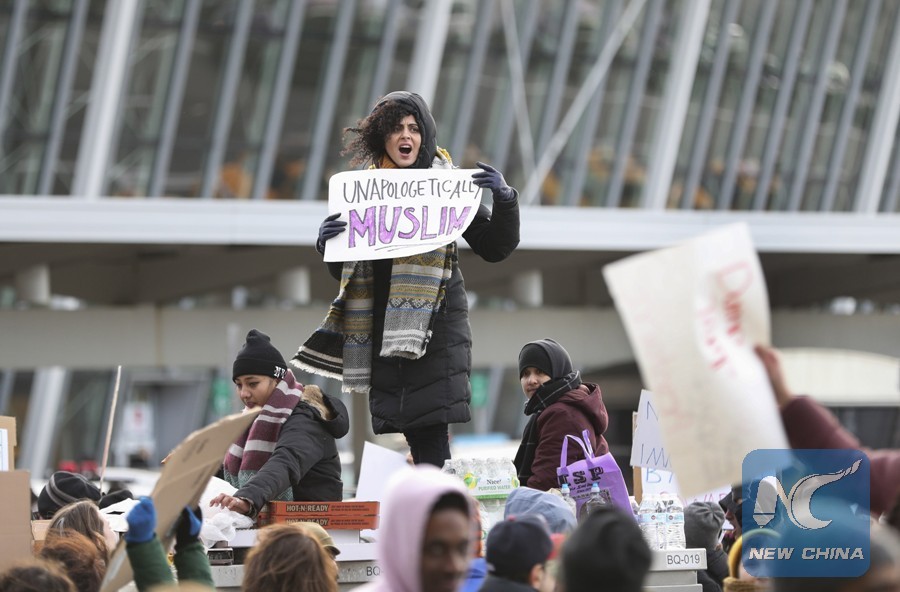WASHINGTON, Feb. 4 (Xinhua) -- The U.S. State Department on Saturday reversed revocation of visas for foreigners under a travel ban which was suspended Friday by a federal judge.

The file photo taken on Jan. 29, 2017 showed that People hold posters during a protest against President Donald Trump's executive order banning entry of citizens from seven Muslim-majority countries, outside the Terminal 4 at John F. Kennedy International Airport in New York, the United States (Xinhua Photo/Wang Ying)
The department said that the foreigners covered by the travel ban who hold a valid visa now may travel to the United States.
The move came after federal judge James Robart in Seattle, Washington state, ruled Friday that President Donald Trump's executive order on the travel ban would be suspended nationwide, effective immediately.
Up to 60,000 visas for citizens from seven majority-Muslim countries covered by the 90-day ban, including Iraq, Iran, Syria, Yemen, Libya, Sudan and Somalia, were "provisionally revoked" under the January travel ban, which triggered worldwide criticism and protests.
In another related development, the U.S. Homeland Security Department also said Saturday that it had suspended all actions to implement the travel ban in accordance with the judge's ruling.
It means it suspended the passenger system rules that flag travelers for operational action subject to the travel ban.
Meanwhile, many international airlines are allowing citizens from the countries covered by the travel ban to board U.S.-bound flights after the judge's ruling, the CNN reported.
Trump signed an executive order on Jan. 27 which bars citizens from the seven predominately Muslim countries from traveling to the U.S. for 90 days, stops accepting refugees for 120 days and indefinitely halts refugees from Syria, in order to protect the U.S. security.
The ban caused confusion at many U.S. airports as some travelers from the seven countries were detained or prevented entering the U.S. without pre-notice.
It sparked mass protests at major airports and cities in the U.S. and some other countries, as protesters decried it as a "Muslim ban" that targets people because of their faith.
Even Trump's predecessor, former President Barack Obama, issued a statement criticizing the Trump move for "discriminating against individuals because of their faith or religion."
Washington state's Attorney General Bob Ferguson filed a lawsuit against the Trump order three days later, arguing that the ban violates constitutional rights of immigrants and their families. The state of Minnesota later joined in the suit.
Despite the court ruling, the legal battle is far from being over, as Trump has vowed to overturn it.
"The opinion of this co-called judge, which essentially takes law-enforcement away from our country, is ridiculous and will be overturned!" Trump said in a tweet Saturday.
Within hours of the ruling, Trump's spokesman Sean Spicer, the White House press secretary, issued a strongly-worded statement vowing to appeal the judge's "outrageous order" at the earliest possible time.
Spicer later issued an amended statement that deleted the word "outrageous."
"The president's order is intended to protect the homeland and he has the constitutional authority and responsibility to protect the American people," Spicer said.















